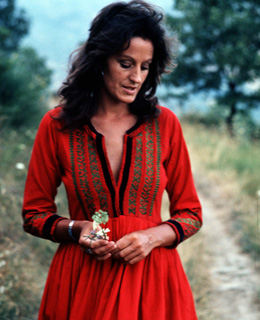
Australian writer and feminist, Germaine Greer, is pictured in a village in Tuscany, Italy in 1974.
In 1972, Ann McGrath, then 16, a student at a Brisbane Roman Catholic school, read a book that had been published two years earlier — its author had herself been a Catholic schoolgirl in Melbourne — and was already an international best seller. When she found the book in her daughter's bedroom, McGrath's distressed mother seized it. But McGrath loved it. "Pretty groovy — good — but a bit rambling, and thinking not always clear ... Many ideas brilliant," she wrote in her private diary, in an assessment that stands up nearly four decades later. Reading Germaine Greer's The Female Eunuch, the teenage McGrath wrote in her teenage hand, gave her "a great feeling of wanting to study and to get educated." And she did.
Now professor of history at the Australian National University, McGrath has teenage girls of her own, and The Female Eunuch today is covered in the history textbook at Canberra Girls' Grammar School. History books are now about the only way young Australians hear about Greer's then revolutionary ideas about power relations between men and women. A pity, according to the school's principal, Susan Just, since the same inequities and dilemmas exist today: "The glass ceiling remains."
Born in 1939, Greer's journey from Melbourne's bay-side suburbs to international smash-hit media feminist via Melbourne, Sydney and Cambridge universities parallels the changes in Australian society over the same period. When Greer was growing up, university education was the preserve of the fortunate few. Smart young Australians took off overseas — mostly, like her, to England, escaping the "cultural cringe" that weighed Australia down with a leaden inferiority complex. Australia was one of the most sexist of western societies — women were banned from the front bar of hotels and had to resign from public-service jobs upon marriage. The conservative government was in the heyday of its unbroken 23-year-long reign when Greer left for Cambridge in 1964. The Pill had not yet made it to the counters of Australia's pharmacies. Backyard abortions were the only kind available. Australia's ocker culture made for a hostile landscape traversed by young women who were divided — and largely ruled.
The rage, resentment and sheer bloodiness of Greer's experience as a girl and young woman underpinned The Female Eunuch. She resented that the Catholic Church's top-drawer education — the one provided by the Jesuits — was denied to her as a girl. She got pregnant and suffered a backyard abortion. She was raped. She endured the routine humiliations of making one's way as an intelligent woman in a misogynistic world and, magnificently, all the while refused to surrender her sovereignty as a human being. Greer ran her own race and then wrote her book to share the hard-fought lessons with the world.
And she could write!
"The Female Eunuch was a thrilling read, and it remains one of the great books of the 20th century," says Professor Marcia Langton of Melbourne University. "It defined the feminist urgings of the time with great literary flair." But Greer's talent wasn't confined to her writing. She was an electrifying presence; television cameras loved her and, combined with her effortless and incendiary lines, helped make her an international media sensation. There were feminists with more thought-out theory and practical programs for change, but Greer was the one who cut through to ordinary women and girls with the message: Don't ask to be liberated, rise up and seize your own power!
When Greer's book was published in 1970, Australia, too, was on the verge of realizing its own possibilities. In 1972 the conservative stranglehold was broken with Gough Whitlam's election as Labor Prime Minister. There was a new national confidence and a progressive and democratizing legislative program expressing it. Whitlam appointed the first ever adviser on women's affairs, Elizabeth Reid, who set in train the first legal changes redressing women's disadvantage. The positive provocation of Germaine Greer loomed in the background, even as she continued living in and proselytizing mostly from England. Greer "has been the single most influential writer in terms of transforming the way that women thought about themselves, and this transformation in self- understanding was in fact revolutionary," says Dr. Sarah Maddison of the University of New South Wales. "It shaped women's expectations and demands, which in turn translated into a gradual transformation of women's status."
There's still a way to go. A 2007 report by Maddison and Emma Partridge paints a picture of women's modest progress against the backdrop of continuing stubborn inequalities in politics and business. Poverty remains overwhelmingly feminized. The gender pay gap just won't go away.
On the positive side, there have never been so many women in positions of power. Australia's current Governor-General, Quentin Bryce, is a woman. Deputy Prime Minister Julia Gillard is a woman. Queensland Premier Anna Bligh is the first woman to be elected in her own right rather than inheriting a political mess mid-term from the boys. The South Australian Liberal Party leadership contest this year was an all-woman affair. And while Greer's later career has sometimes seemed a ragtag mix of ill-judged media forays, The Female Eunuch endures as a revolutionary read. The seed she planted continues to grow, even as the terrain remains rocky.
"She provided openings rather than solutions," McGrath, once her teenage fan, observes today. Touched by her ideas as a girl, McGrath felt they had somehow joined forces. Millions of other women feel the same way.
Christine Wallace is an Australian political journalist and author of several biographies, including Germaine Greer: Untamed Shrew